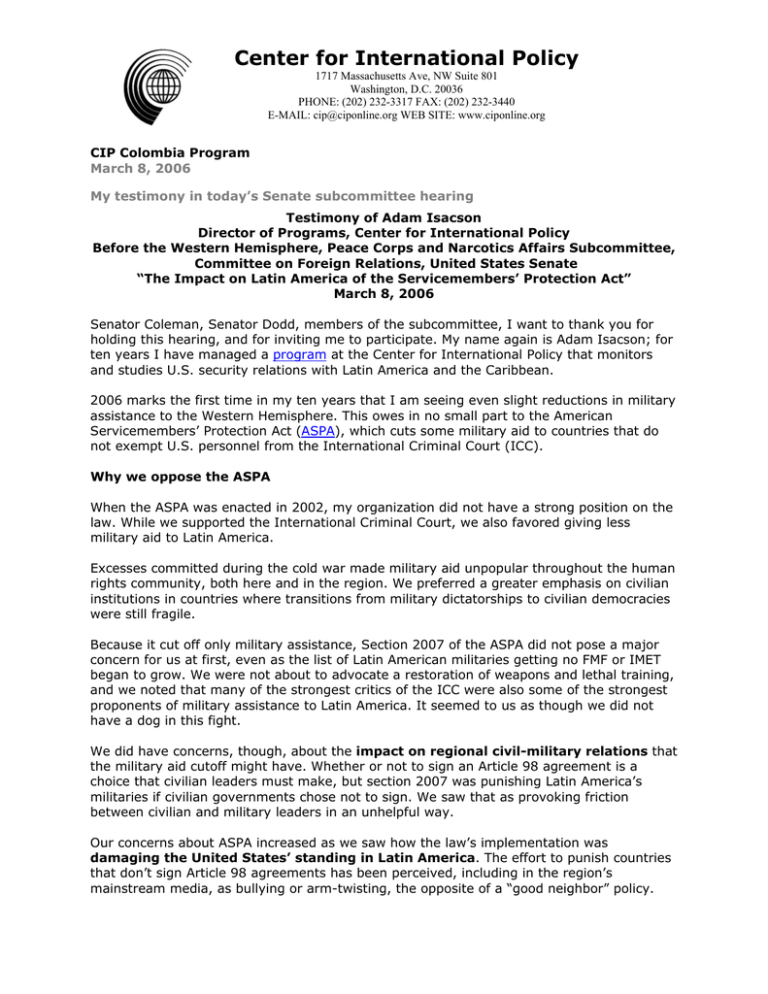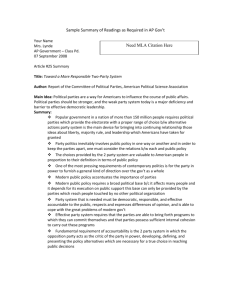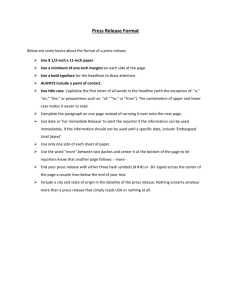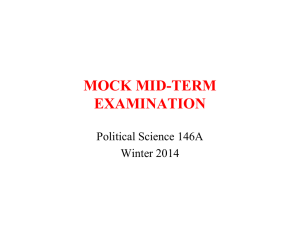Center for International Policy
advertisement

Center for International Policy 1717 Massachusetts Ave, NW Suite 801 Washington, D.C. 20036 PHONE: (202) 232-3317 FAX: (202) 232-3440 E-MAIL: cip@ciponline.org WEB SITE: www.ciponline.org CIP Colombia Program March 8, 2006 My testimony in today’s Senate subcommittee hearing Testimony of Adam Isacson Director of Programs, Center for International Policy Before the Western Hemisphere, Peace Corps and Narcotics Affairs Subcommittee, Committee on Foreign Relations, United States Senate “The Impact on Latin America of the Servicemembers’ Protection Act” March 8, 2006 Senator Coleman, Senator Dodd, members of the subcommittee, I want to thank you for holding this hearing, and for inviting me to participate. My name again is Adam Isacson; for ten years I have managed a program at the Center for International Policy that monitors and studies U.S. security relations with Latin America and the Caribbean. 2006 marks the first time in my ten years that I am seeing even slight reductions in military assistance to the Western Hemisphere. This owes in no small part to the American Servicemembers’ Protection Act (ASPA), which cuts some military aid to countries that do not exempt U.S. personnel from the International Criminal Court (ICC). Why we oppose the ASPA When the ASPA was enacted in 2002, my organization did not have a strong position on the law. While we supported the International Criminal Court, we also favored giving less military aid to Latin America. Excesses committed during the cold war made military aid unpopular throughout the human rights community, both here and in the region. We preferred a greater emphasis on civilian institutions in countries where transitions from military dictatorships to civilian democracies were still fragile. Because it cut off only military assistance, Section 2007 of the ASPA did not pose a major concern for us at first, even as the list of Latin American militaries getting no FMF or IMET began to grow. We were not about to advocate a restoration of weapons and lethal training, and we noted that many of the strongest critics of the ICC were also some of the strongest proponents of military assistance to Latin America. It seemed to us as though we did not have a dog in this fight. We did have concerns, though, about the impact on regional civil-military relations that the military aid cutoff might have. Whether or not to sign an Article 98 agreement is a choice that civilian leaders must make, but section 2007 was punishing Latin America’s militaries if civilian governments chose not to sign. We saw that as provoking friction between civilian and military leaders in an unhelpful way. Our concerns about ASPA increased as we saw how the law’s implementation was damaging the United States’ standing in Latin America. The effort to punish countries that don’t sign Article 98 agreements has been perceived, including in the region’s mainstream media, as bullying or arm-twisting, the opposite of a “good neighbor” policy. As aid cutoffs proceeded, two very negative messages were received throughout Latin America, whether fairly or not. The first was, “The U.S. government, which often scolds us about our human rights records, is now trying to protect its soldiers from an international human rights body.” (This message was especially poorly timed, coming just as revelations of abuses at Abu Ghraib and Guantánamo began to surface.) The second message was, “The U.S. government doesn’t trust us not to extradite its military personnel to The Hague for frivolous reasons.” The ASPA became one of several reasons why the United States’ approval ratings in most Latin American countries have dropped sharply since 2000 (see box). In this context, we were treated to the spectacle of democratically-elected Latin American leaders, most of them from countries that maintain good relations with Washington, wearing their refusal to sign Article 98 agreements as a badge of honor. • • • • • “Absolutely no one is going to make me cower. Neither the government, nor Alfredo Palacio nor the Ecuadorian people need to be afraid.” – Ecuadorian President Alfredo Palacio, June 2005 “[Signing an Article 98 agreement] would go against the multilateral order and against the principles of defense of human rights. … We may be poor, but we have our dignity.” – Costa Rican Foreign Minister Roberto Tovar, September 2005 “We will not change our principles for any amount of money. We're not going to [go] belly up for $300,000 in training funds.” – Barbadian ambassador to the Organization of American States Michael I. King, August 2005 “We will assume any consequences that might result from our signature [of the Rome Statute]. It is a signature that comes from our principles and this government’s political convictions. Whether or not there will be a reduction in U.S. aid is not relevant to us, what is relevant is that our Source: convictions and principles mean something.” – Mexican Latinobarómetro, via The Presidency spokesman Rubén Aguilar, February 2006 Economist “Peru will not sign any agreement that impedes it from submitting any country’s citizens to the jurisdiction of the International Criminal Court. Peru rejects pressure from any other country on its foreign policy.” – Peruvian Foreign Minister Manuel Rodríguez, August 2004 It is a great shame that, for the region’s elected leaders, these defiant statements against U.S. policy were an easy way to gain domestic political support. This speaks volumes about the damage that the ASPA sanctions are doing to Latin Americans’ attitudes toward us. By 2005, eleven Latin American countries had their FMF and IMET military assistance cut down to nothing. That number grew to twelve late last year when Mexico ratified the Rome Statute and refused to sign an Article 98 agreement. Chile too may be close to ratifying the International Criminal Court, and may soon be added to the list of sanctioned countries. The damage was worsened by the so-called “Nethercutt provision” added in December 2004 to the Foreign Operations Appropriations bill. For the first time, the sanctions went beyond military aid to include Economic Support Funds, one of USAID’s core economic-aid programs. Suddenly, badly needed development and democracy programs were in play, and even more resources were taken from the most potentially pro-U.S. governments in the region. Though an exception has been made for democracy and rule of law programs, Economic 2 Support Funds to sanctioned Latin American countries will decline by more than 55 percent from 2003 to 2006, from $52 million to $23 million. Policy alternatives What can be done about the harm that ASPA is doing to U.S. relations with our friends in Latin America? The simplest answer would be to repeal Section 2007 of the American Servicemembers’ Protection Act, and to omit the Nethercutt provision from the 2007 Foreign Operations Appropriations law. There is no shame in recognizing that these sanctions have proven to be too blunt an instrument, that they have hurt relations with our friends in a region where the U.S. image is already suffering, and that they have provided grist for regional leaders, like Venezuela’s Hugo Chávez, who have gained adherents by portraying the United States as a unilateralist bully. Repealing the ASPA sanctions would send a message to Latin America and the rest of the world that we “get it,” that we understand the importance of multilateralism and mutual respect as a way to resolve such concerns as the possibility of U.S. personnel being unjustly extradited to The Hague. It would also send a message that we trust our own diplomatic corps to determine which countries pose any threat of detaining and extraditing U.S. personnel for spurious reasons. If our Department of State believes such a danger exists, it should impose its own sanctions and pull out personnel as necessary. It does not need a legal provision to inflexibly trigger a blanket punishment. I strongly doubt that revoking the sanctions would increase the threat of U.S. personnel being sent to the ICC for politically motivated reasons. After all, the sanctions have frozen only a portion of U.S. military assistance. With the likely exception of Venezuela, the security forces of the twelve sanctioned Latin American countries can still get aid through State Department programs outside the ASPA’s jurisdiction, such as International Narcotics Control and anti-terror, border security and small-arms programs. Aid also flows from the Defense Department, through its large counter-narcotics aid program, the fast-growing Counter-Terrorism Fellowship Program, and the Southern Command’s many joint exercises and training deployments. None of these activities has been curtailed by the ASPA, and as a result, the countries being sanctioned have experienced only modest reductions in overall aid and training levels. For instance, all continue to send students to the Western Hemisphere Institute for Security Cooperation at Fort Benning, Georgia. Yet I have heard no expressions of concern about the legal status of the dozens of U.S. personnel who, right now, are present in sanctioned countries to carry out these programs. I understand that it may prove politically difficult to repeal Section 2007, though I hope at least that the Nethercutt provision, which is perceived in the region as particularly meanspirited, may cease to appear in the foreign operations bill. If a legislative fix proves to be impossible, though, all is not lost. The law gives the executive branch a good deal of flexibility in its application. It is up to the executive to take advantage of this flexibility. First, Section 2007 includes a “national interest waiver.” According to subsection (b) of that section, aid to a sanctioned country may flow freely if the President tells Congress that doing so “is important to the national interest of the United States.” Those of us who have worked on human rights over the years have come to view such waivers as a bit of a joke, because they are usually invoked without a second thought. In 3 past foreign aid legislation, the addition of a “national interest waiver” has taken the teeth out of attempts to stop assistance to foreign militaries with poor human-rights records. Whether run by a Democrat or a Republican, the administration in power can be expected to exercise that waiver at the first opportunity, and aid to the abusive military will begin to flow. When the ASPA was enacted, I expected the Bush administration to grant waivers in the majority of cases, especially when it came to countries that were considered good friends and top aid recipients, like Mexico, Peru or Ecuador. Instead, the waiver power has been used quite sparingly, and even some of our closest allies in Latin America have been stung by the sanctions. Clearly, a greater willingness to issue national interest waivers – as happens routinely when enforcing human rights conditions – would undo much of the damage the ASPA has inflicted on U.S. relations with the region. Second, in the cases of countries with which the United States has a history of close relations, the law offers another way to avoid sanctions: declare those countries to be Major Non-NATO Allies. Section 517 of the Foreign Assistance Act, enacted in 1996, allows the president to grant this status to a foreign country. This is a largely symbolic label, since major non-NATO allies do not enjoy the mutual defense and security guarantees given to members of the North Atlantic Treaty Organization. It merely implies that a close working relationship exists with a country's defense forces. Other benefits are very small: they include priority access to excess defense articles, stockpiling of U.S. arms and equipment, participation in cooperative research and development programs – and now, exemption from the sanctions in Section 2007 of the ASPA. Argentina, named in 1998, is the United States’ only Major Non-NATO Ally in Latin America. Granting this status to a few more U.S. friends in the region would undo the ASPA sanctions while having little or no impact on the flow of U.S. military aid. Whether through abolition of Section 2007 of the ASPA, or through a mix of waivers and Major Non-NATO Ally determinations, it should be relatively easy to extract us from the blind alley that the ASPA sanctions have proven to be in Latin America. The additional risk to U.S. personnel in the region will be zero, since many are already there, carrying out programs funded through other means. Latin America is in a critical period of political upheaval, in which citizens are showing more frustration with poverty, inequality, and corruption, and losing faith in the democratic process. This is a time when the United States must be a generous partner and a positive force in the region – not a scold seeking new reasons to distrust and disengage. This is no time to levy sanctions against our friends. 4 5 6 7 8






